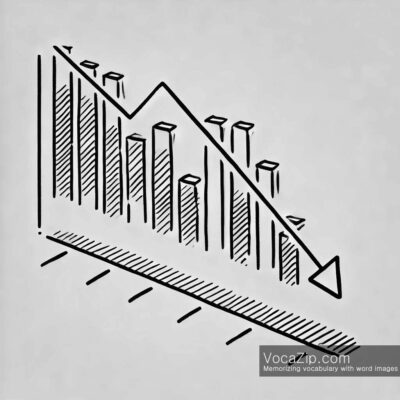deficit meaning
deficit :
a shortage, lack
noun
▪ The company is experiencing a deficit this year.
▪ The company is experiencing a shortage of money this year.
▪ The government announced a budget deficit.
▪ The government announced a budget shortage.
paraphrasing
▪ shortage – deficit
▪ lack – deficit
▪ deficiency – deficit
▪ gap – deficit

Pronunciation
deficit [ˈdɛf.ɪ.sɪt]
The stress is on the first syllable 'def,' and it sounds like 'DEF-i-sit'.
Common phrases and grammar about deficit
deficit - Common meaning
noun
a shortage, lack
Part of Speech Changes for "deficit"
▪ deficiency (noun) – a lack or shortage
▪ deficitary (adjective) – having a deficit or shortage
▪ deficit financing (noun) – borrowing to cover a deficit
Common Expressions with "deficit"
▪ budget deficit – a shortage in the budget
▪ trade deficit – when a country imports more than it exports
▪ fiscal deficit – related to government finances
▪ current deficit – present shortage in resources
Important examples of deficit in TOEIC
Vocabulary examples from the TOEIC test
In TOEIC word questions, deficit is usually used to refer to a shortage or lack of money or resources.
Example of a confusing word: surplus (an excess)
Grammar examples from the TOEIC test
Deficit is a noun and may require correct article usage in TOEIC grammar questions.
deficit
Idioms and fixed expressions in TOEIC
budget deficit
used in discussions about finances in TOEIC passages.
trade deficit
used in discussions about international trade in TOEIC passages.
Differences between similar words and deficit
deficit
,
shortage
differences
deficit is often used in financial contexts, while shortage is a more general term for not having enough of something.
deficit
,
deficiency
differences
deficit refers to a lack in quantity, often financial, while deficiency refers to a lack in quality or ability.
Words with the same origin as deficit
The origin of deficit
deficit comes from the Latin 'deficere,' meaning 'to fail or lack.'
Word structure
It has the prefix 'de' (from), root 'fic' (to make), and suffix 'it,' so deficit means 'a lack or failure.'
Words with the same origin
The root of deficit is 'fic' (from 'facere' to make). Words with the same root include 'deficiency' and 'defective.'






